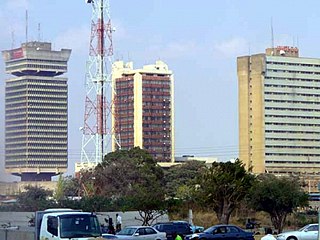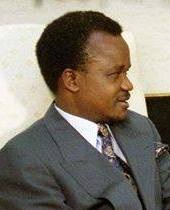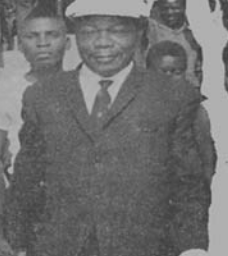Related Research Articles

The International Monetary Fund (IMF) is a major financial agency of the United Nations, and an international financial institution funded by 190 member countries, with headquarters in Washington, D.C. It is regarded as the global lender of last resort to national governments, and a leading supporter of exchange-rate stability. Its stated mission is "working to foster global monetary cooperation, secure financial stability, facilitate international trade, promote high employment and sustainable economic growth, and reduce poverty around the world." Established in July 1944 at the Bretton Woods Conference, primarily according to the ideas of Harry Dexter White and John Maynard Keynes, it started with 29 member countries and the goal of reconstructing the international monetary system after World War II. It now plays a central role in the management of balance of payments difficulties and international financial crises. Through a quota system, countries contribute funds to a pool from which countries can borrow if they experience balance of payments problems. As of 2016, the fund had SDR 477 billion.

Kenneth Kaunda, also known as KK, was a Zambian politician who served as the first president of Zambia from 1964 to 1991. He was at the forefront of the struggle for independence from British rule. Dissatisfied with Harry Nkumbula's leadership of the Northern Rhodesian African National Congress, he broke away and founded the Zambian African National Congress, later becoming the head of the socialist United National Independence Party (UNIP).

Zambia, officially the Republic of Zambia, is a landlocked country at the crossroads of Central, Southern and East Africa. It is typically referred to being in South-Central Africa or Southern Africa. It is bordered to the north by Democratic Republic of the Congo, Tanzania to the north-east, Malawi to the east, Mozambique to the southeast, Zimbabwe and Botswana to the south, Namibia to the southwest, and Angola to the west. The capital city of Zambia is Lusaka, located in the south-central part of Zambia. The population is concentrated mainly around Lusaka in the south and the Copperbelt Province to the north, the core economic hubs of the country.

The politics of Zambia takes place in a framework of a presidential representative democratic republic, whereby the president of Zambia is head of state, head of government and leader of a multi-party system. Executive power is exercised by the government, while legislative power is vested in both the government and parliament. Formerly Northern Rhodesia, Zambia became a republic immediately upon attaining independence in October 1964.

Zambia is a developing country, and it achieved middle-income status in 2011. Through the first decade of the 21st century, the economy of Zambia was one of the fastest-growing economies in Africa, and its capital, Lusaka, the fastest-growing city in the Southern African Development Community (SADC). Zambia's economic performance has stalled in recent years due to declining copper prices, significant fiscal deficits, and energy shortages.

Frederick Jacob Titus Chiluba was a Zambian politician who was the second president of Zambia from 1991 to 2002. Chiluba, a trade union leader, won the country's multi-party presidential election in 1991 as the candidate of the Movement for Multi-party Democracy (MMD), defeating long-time President Kenneth Kaunda. He was re-elected in 1996. As he was unable to run for a third term in 2001, former Vice President Levy Mwanawasa instead ran as the MMD candidate and succeeded him. After leaving office, Chiluba was the subject of a long investigation and trial regarding alleged corruption; he was eventually acquitted in 2009.

The president of Zambia is the head of state and the head of government of Zambia. The office was first held by Kenneth Kaunda following independence in 1964. Since 1991, when Kaunda left the presidency, the office has been held by seven others: Frederick Chiluba, Levy Mwanawasa, Rupiah Banda, Michael Sata, Edgar Lungu and the current president Hakainde Hichilema, who won the 2021 presidential election. In addition, acting president Guy Scott served in an interim capacity after the death of President Michael Sata.

Moussa Traoré was a Malian soldier, politician, and dictator who was President of Mali from 1968 to 1991. As a lieutenant, he led the military ousting of President Modibo Keïta in 1968. Thereafter he served as head of state until March 1991, when he was overthrown by popular protests and a military coup.
Mainza Mathias Chona was a Zambian politician and founder of UNIP who served as the third vice-president of Zambia from 1970 to 1973 and Prime Minister on two occasions: from 25 August 1973 to 27 May 1975 and from 20 July 1977 to 15 June 1978.

The Football Association of Zambia is the governing body of association football in Zambia founded in 1929 and based at the "Football House" on Alick Nkhata Road in Lusaka, the country's capital.
Alice Lenshina (1920–1978) was a Zambian woman, prisoner of conscience and self-appointed "prophetess" who is noted for her part in the "Lumpa Uprising", which claimed 700 lives.

Harry Mwaanga Nkumbula was a Zambian nationalist leader involved in the movement for the independence of Northern Rhodesia, as Zambia was known until the end of British rule in 1964. He was born in the village of Maala in the Namwala district of Zambia's southern province. He was the youngest of three children and the only son.
Christianity has been very much at the heart of religion in Zambia since the European colonial explorations into the interior of Africa in the mid 19th century. The area features heavily in the accounts of David Livingstone's journeys in Central Africa.
Sir Evelyn Dennison Hone was the last Governor of Northern Rhodesia, from 1959 until it gained its independence as Zambia in 1964.
The Times of Zambia is a national daily newspaper published in Zambia and headquartered in Ndola.
Ng'andu Peter Magande, was a Zambian politician and economist. He served as the Minister of Finance and National Planning of the Republic of Zambia from 2003 to 2008. He also served as a Member of Parliament for Chilanga Constituency from 2006 until 2010 and the Chairman of the MMD Party Committee on Economy and Finance.

People's Republic of China – Zambia relations refers to the current and historical relationship between the People's Republic of China (PRC) and Zambia.
Vernon Johnson Mwaanga is a Zambian diplomat and politician.

Kabwata is a constituency of the National Assembly of Zambia. It covers the Lusaka suburbs of Kabwata, Libala and Chilenje in Lusaka District of Lusaka Province.

The Ministry of Finance is a ministry in Zambia. It is headed by the Minister of Finance, who is responsible for public finances.
References
- ↑ Simon, David J.; Pletcher, James R.; Siegel, Brian V., eds. (2008). "Chigaga, Gibson". Historical Dictionary of Zambia. African Historical Dictionaries. Vol. 106 (3rd ed.). Metuchen, New Jersey: Scarecrow Press. p. 51. ISBN 978-0-8108-5305-8.